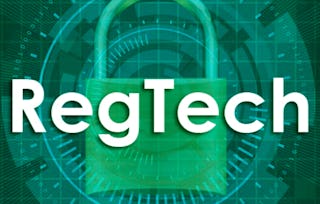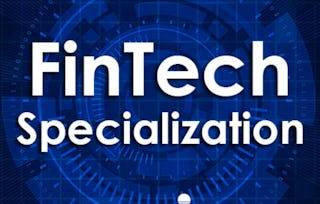Being a successful FinTech firm requires more than just great technology; it also requires an understanding of the laws and regulations applicable to your business. This course will provide you with that understanding. You will learn about the critical legal, regulatory, and policy issues associated with cryptocurrencies, initial coin offerings, online lending, new payments and wealth management technologies, and financial account aggregators. In addition, you will learn how regulatory agencies in the U.S. are continually adjusting to the emergence of new financial technologies and how one specific agency has proposed a path for FinTech firms to become regulated banks. You will also learn the basics of how banks are regulated in the U.S.

FinTech Law and Policy

893 reviews
Skills you'll gain
- Financial Regulation
- Digital Assets
- FinTech
- Payment Systems
- Financial Services
- Blockchain
- Bank Regulations
- Law, Regulation, and Compliance
- Lending and Underwriting
- Banking Services
- Financial Data
- Skills section collapsed. Showing 10 of 11 skills.
Details to know

Add to your LinkedIn profile
15 assignments
See how employees at top companies are mastering in-demand skills

There are 6 modules in this course
In this course, you will learn about the critical legal, regulatory, and policy issues associated with cryptocurrencies, initial coin offerings, online lending, new payments and wealth management technologies, and financial account aggregators. In addition, you will learn how regulatory agencies in the U.S. are continually adjusting to the emergence of new financial technologies and how one specific agency, the Office of the Comptroller of the Currency, has proposed a path for FinTech firms to become regulated banks.
What's included
2 videos3 readings
This module begins with a preview of the key regulatory challenges facing FinTech firms and provides several examples of what can happen when FinTech firms fail to comply with applicable laws and regulations. We then look at how the FinTech industry has evolved post-2008 - from a disrupt mentality to one of “strategic partnership” - along with corresponding FinTech industry investment trends. Next, we examine the challenges regulators face in responding to new FinTech developments and detail how several U.S. regulatory agencies have adjusted thus far. We conclude this module by exploring one specific regulatory approach, known as a “sandbox,” that has been deployed in other countries and in one U.S. state.
What's included
5 videos3 assignments
This module first provides an overview of cryptocurrencies and distributed ledger technology, and then examines how cryptocurrency is regulated by various state and federal agencies. You will also learn how cryptocurrency is regulated as: money, a commodity, and property. The module concludes with an examination of initial coin offerings and their regulatory treatment.
What's included
6 videos3 assignments
This module will introduce you to the various types of FinTech lending models and the regulatory treatment of these lenders. You will learn how many FinTech lenders are partnering with regulated banks to get around the state-by-state restrictions that apply to non-bank lenders.
What's included
6 videos3 assignments
Many FinTech firms are interested in becoming regulated banks. This module will teach you about the process of becoming a bank and the government agencies responsible for regulating banks in the U.S. We will look at the Office of the Comptroller of the Currency’s proposal to grant a new type of bank charter specifically for FinTech firms and the options currently available to FinTech firms that would like to become a bank.
What's included
3 videos2 assignments
The final module begins with an overview of the legal framework applicable to legacy payment systems in the U.S., followed by a review of how some FinTech firms are building on top of these systems to provide faster, more convenient, consumer payments while other FinTech firms are bypassing these systems all together by utilizing distributed ledger technology. From there we examine new technologies being deployed in the wealth management industry, including the use by some firms of “robo-advisors” to allocate investors’ portfolios using algorithms based on the investors’ data and risk preferences. You will see that robo-advisors are subject to the same oversight as traditional investment advisers. The module concludes by exploring the legal issues surrounding FinTech companies that allow consumers to aggregate the information from their various financial accounts.
What's included
7 videos1 reading4 assignments
Instructor

Offered by
Explore more from Finance
 Status: Free Trial
Status: Free TrialUniversity of Pennsylvania
 Status: Free Trial
Status: Free TrialThe Hong Kong University of Science and Technology
 Status: Free Trial
Status: Free TrialUniversity of Cape Town
 Status: Free Trial
Status: Free TrialThe Hong Kong University of Science and Technology
Why people choose Coursera for their career

Felipe M.

Jennifer J.

Larry W.

Chaitanya A.
Learner reviews
- 5 stars
80.31%
- 4 stars
16.77%
- 3 stars
2.23%
- 2 stars
0.33%
- 1 star
0.33%
Showing 3 of 893
Reviewed on Feb 13, 2019
This is a good course to understand the regulatory environment in the US surrounding fintech, the lacunae and the challenges in regulations.
Reviewed on Sep 18, 2020
Great insight and perfect curriculum to understand Fintech Law and Policy. Special thanks to Mr. Lee Reiners for making such complex subject easier to understand.
Reviewed on Nov 30, 2020
I) Incredibly informative contentII) Well-OrganizedIII) Top class lecturer, superb mentoringIV) Course material and take away resources are extremely beneficial

Open new doors with Coursera Plus
Unlimited access to 10,000+ world-class courses, hands-on projects, and job-ready certificate programs - all included in your subscription
Advance your career with an online degree
Earn a degree from world-class universities - 100% online
Join over 3,400 global companies that choose Coursera for Business
Upskill your employees to excel in the digital economy
Frequently asked questions
To access the course materials, assignments and to earn a Certificate, you will need to purchase the Certificate experience when you enroll in a course. You can try a Free Trial instead, or apply for Financial Aid. The course may offer 'Full Course, No Certificate' instead. This option lets you see all course materials, submit required assessments, and get a final grade. This also means that you will not be able to purchase a Certificate experience.
When you purchase a Certificate you get access to all course materials, including graded assignments. Upon completing the course, your electronic Certificate will be added to your Accomplishments page - from there, you can print your Certificate or add it to your LinkedIn profile.
Yes. In select learning programs, you can apply for financial aid or a scholarship if you can’t afford the enrollment fee. If fin aid or scholarship is available for your learning program selection, you’ll find a link to apply on the description page.
More questions
Financial aid available,

